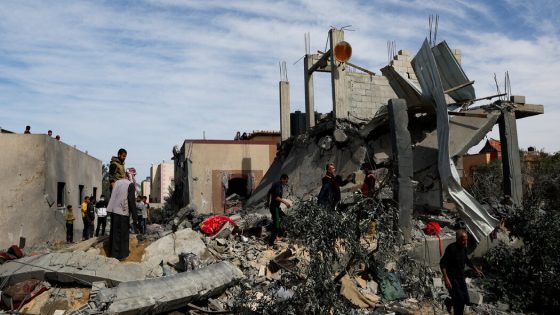The number of aid trucks entering Gaza dropped significantly in February, data shows, even as humanitarian leaders warned of famine and demanded that Israel and others increase aid to civilians trapped in the enclave.
The deaths of dozens of people amid a rush for food aid on Thursday underlined the degree of desperation in the territory.
An average of 96 trucks a day entered Gaza through Feb. 27, a 30 percent drop from the January average and the lowest monthly average since before a cease-fire in late November, according to data from UNRWA, the U.N. aid agency for Gaza.
“It has been stop and go,” said Juliette Touma, a spokeswoman for UNRWA. “It’s been far from regular and far from enough. We should have seen an increase, but there’s been a significant decrease.”
Aid trucks carry food, medicine and other necessities, and while a reduction in the numbers suggests a reduction in overall volume, the measure is not exact. A relatively small quantity of aid has also been dropped by plane to people in Gaza.
The decline reflects, in part, the stringency of inspection measures at the Kerem Shalom crossing in southern Israel, which has acted as the main gateway since it was reopened in December. Goods also pass into Gaza from Egypt through a crossing at the city of Rafah after undergoing Israeli inspection at a separate site.
The chief economist at the U.N. World Food Program, Arif Husain, said that other factors also impeded deliveries, including insecurity in Gaza and the fact that there are currently only two border crossing points through which aid is allowed to pass.
Israeli checks on goods entering Gaza aim to weed out items that could potentially be used by Hamas. Aid officials said in interviews that, while necessary, the inspection system caused significant delays that resulted in less overall aid. Before the war, around 500 trucks carrying aid entered Gaza each day.
In addition, Israeli protesters demanding the release of the roughly 100 hostages believed to be still alive in Gaza have impeded the flow of aid at Kerem Shalom.
The U.S. special envoy for humanitarian aid, David Satterfield, said last month that Israeli military strikes on Palestinian police officers were making it nearly impossible to distribute aid once it entered Gaza because security forces normally protect aid from desperate populations.
“Very little aid has been arriving,” said Alaa Fayad, a veterinarian who has been displaced to the central city of Deir al Balah. He said that an absence of Palestinian security forces had enabled gangs to steal some of the food that arrived.
Jan Egeland, a former U.N. humanitarian coordinator who leads the Norwegian Refugee Council humanitarian agency indicated that Israel could allow an increase in the amount of aid entering the territory.
“The system is broken, and Israel could fix it for the sake of the innocent,” he said on Wednesday in a post in the X social media network following a visit to the border area.
Israel’s agency overseeing policy for the Palestinian territories, known as COGAT, pointed a finger at those distributing aid. As an example, the agency said that there were more than 200 trucks waiting to be picked up at Kerem Shalom and that Israel has placed no limit on the amount of aid that can enter.
The decline in aid suggests that calls by the United States and other governments for a rapid increase in help for civilians have not immediately borne fruit. It could also have wider repercussions. In an interim ruling in January, the world’s top court, the International Court of Justice, ordered Israel to enable humanitarian assistance and basic services in Gaza.
Some aid officials said that they hoped that a cease-fire between Israel and Hamas would prompt an increase in aid. Some 300 aid trucks — a peak since Oct. 7 — entered Gaza during one day of the weeklong cease-fire in late November.
Gaza was dependent on aid deliveries even before the war, when two-thirds of its people were supported with food assistance. Today, food aid is required by almost the entire population of 2.2 million people.
“The risk of famine is being fueled by the inability to bring critical food supplies into Gaza in sufficient quantities, and the almost impossible operating conditions faced by our staff on the ground,” Carl Skau, the deputy executive director at the World Food Program, a United Nations agency, told the Security Council this week.
Gaya Gupta, Adam Sella and Nader Ibrahim contributed reporting.
Source Agencies


